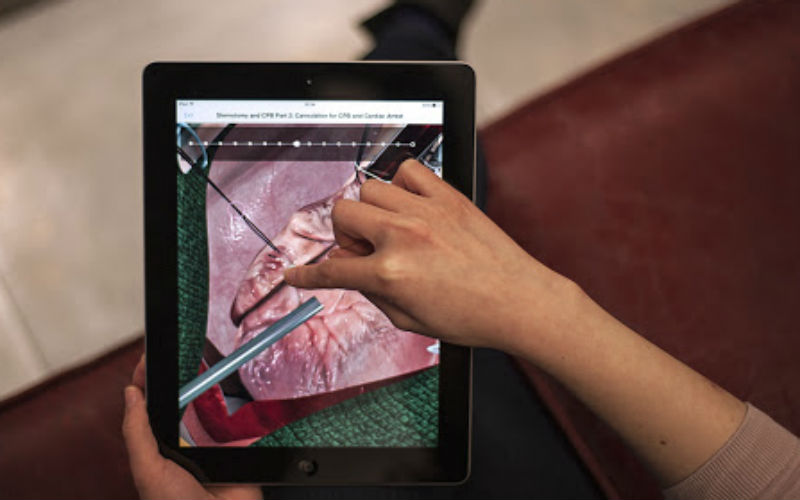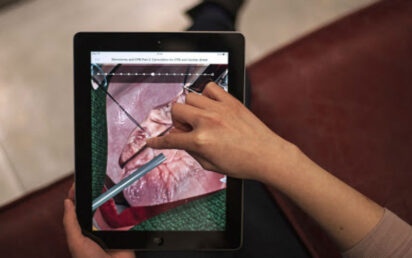On Jean Nehme’s first day as a junior doctor, he made a mistake which could have had disastrous consequences.
Asked by a senior to take blood from a high risk patient, he realised that years of passing exams and practising on mannequins suddenly meant very little: for Nehme was petrified of blood.
Having finally found a vein, he managed to take the sample. But in transferring it to the storage vessel, he managed to stab himself with the needle – and ended up in the emergency department taking medications to prevent himself from contracting blood-borne conditions.
“I could have done worse things with scalpels,” the former surgeon confesses to BusinessCloud after his Touch Surgery platform was voted No.1 in our 100 HealthTech Pioneers ranking.
Londoner Nehme says studying was a rewarding experience but did not prepare him for the transition to practice. “There’s a lot of theory, and turning that theory into practical knowledge is the challenge,” he says.
When it comes to operations, this practical knowledge was carried out under the maxim ‘see one, do one, teach one’, he recalls, but he felt that ‘seeing one’ wasn’t enough: “You should see hundreds.”
THE 100 HEALTHTECH PIONEERS RANKING IN FULL

It is believed that diseases requiring surgical procedures cause more deaths worldwide than HIV/AIDS, TB and Malaria combined.
Against this backdrop, in 2013 he and fellow doctor Andre Chow founded Digital Surgery. Its Touch Surgery platform offers access to immersive, interactive surgical simulations which doctors can use to learn, rehearse and test for their next procedure. Nehme says it is now being used by millions.
The web platform and mobile app includes instructions for around 200 surgical procedures in 18 specialities including dentistry, neurosurgery, plastic surgery and trauma & emergency procedures. For example, a ‘basic lumbar puncture’ is listed under anaesthetics, COVID-19 and emergency medicine.
It is a world away from the meagre resources Nehme and his peers were once accustomed to. “I used to go into a hospital and I’d have my phone – this little computer on which I could search for anything and order food – but inside the hospital I’d be taking out a pager and would have to fax requests,” he recalls.

Among the entrepreneur’s significant milestones are raising more than $90m in investment – among the largest amounts for a HealthTech globally – and its acquisition in February of this year by US-based medical technology company Medtronic. Nehme wouldn’t reveal the size of the deal, but says it was significant.
Still based in London, the growing team is now building tech which has moved from the lecture hall to the operating theatre. Its surgical video storage and analytics platform, Touch Surgery Professional (below), is a secure place for the recording and playback of surgeries. It offers a chance to review surgery performance, annotate and share with others.

But Nehme says the third arm of the business is the one he is most excited about: artificial intelligence and robotics. While there are already tools such as keyhole surgery machines in the operating theatre which could be considered robotic, he says they “aren’t intelligent, smart robotic systems – they are still controlled by surgeons”.
That could change within five years, he predicts. “What we demonstrated just over two years ago was that we could bring a computer into the operating room. With the same type of technology that is in self-driving cars, we trained a computer to understand the surgical process so it can predict the surgeon’s next step.”
Using that autonomous vehicle analogy, he says you first need a map, then journey planning – in this case surgery and procedures – before integrating the technology into cars (theatres) to assist drivers (surgeons). Digital Surgery’s technology is not designed to replace the person behind the wheel, but to keep people as safe as possible.
The health sector is often slow to adopt cutting-edge tech for fear of errors and red tape, a bridge which Nehme says is a “hard one to cross”. However he argues that risk aversion is in fact the core benefit of the firm’s new machine learning surgical assistant. He argues that even the best surgeon cannot be aware of everything happening during a surgery: an instrument could turn on accidentally, for example, and either remain unnoticed or cause a distraction.
“We don’t want to replace surgeons, we want to support them,” he says. “Surgery is complicated enough: it requires a huge amount of brain power and there are always risks. Any technology which can take away risk is valuable for patient and surgeon.”
THE 100 HEALTHTECH PIONEERS RANKING IN FULL
However bringing this new machine learning technology into the operating room means more computing power: “More chips in operating rooms, whether that’s Intel or Nvidia, processing inputs in real-time.”
The firm, which now sits within parent company Medtronic’s robotics division, is now playing “a supporting role in their robotic activities”.
Nehme says a step-change is happening in healthcare thanks to the types of computational technologies it is developing. However he has not ruled out the possibility of one day returning to the surgical table himself, and recently volunteered his skills during COVID-19.
Despite a goal of helping the potential five billion people who don’t have access to safe surgical services, he says he misses surgery because it is rewarding to directly make people better.
“I remember small things like children who had injured themselves, who three weeks later would have scars healing and be better,” he says.


